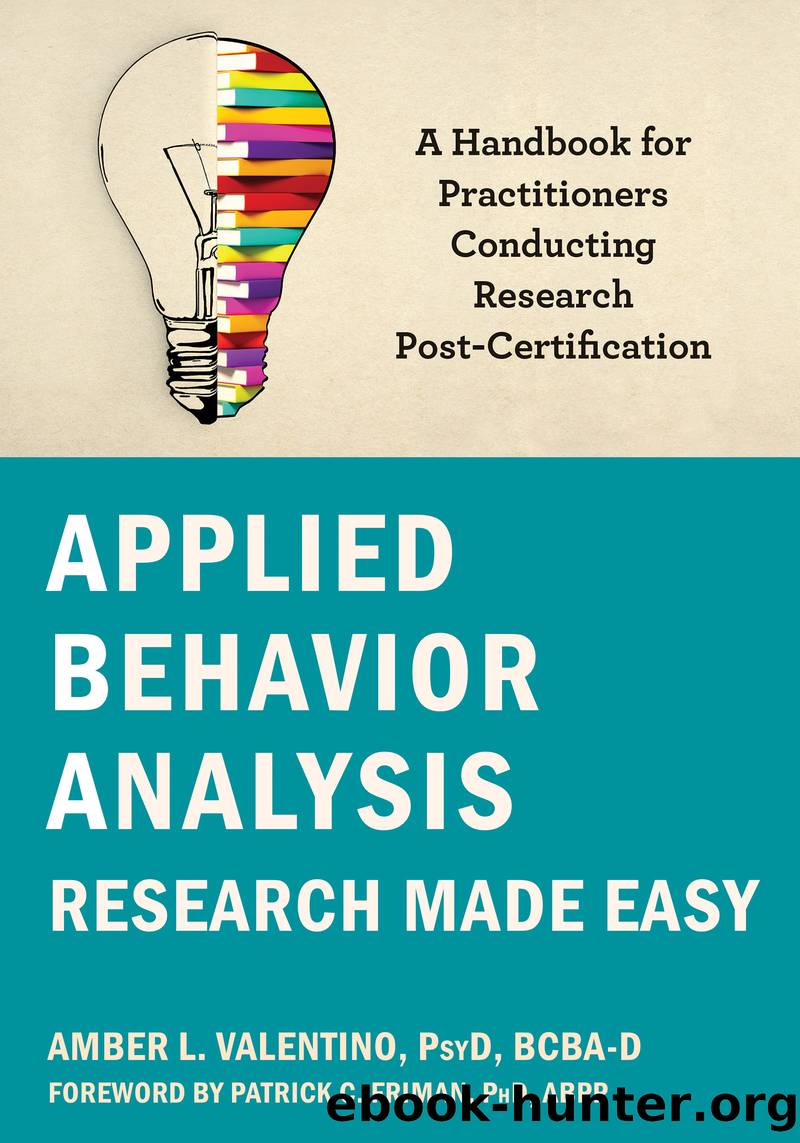Applied Behavior Analysis Research Made Easy by Amber L. Valentino

Author:Amber L. Valentino
Language: eng
Format: epub
Publisher: New Harbinger Publications
Published: 2021-11-18T20:17:53+00:00
Obstacles
It is common for practitioners to experience obstacles in their quest to conduct research. Obstacles are often related to oneâs own feelings and ideas about the task at hand. Luckily, obstacles can be easily overcome by engaging in specific actions. In this next section, I describe some of the most common obstacles practitioners face and actions you can take to overcome them.
Obstacle 1: Lack of Knowledge
Many of the respondents to our survey said that lack of knowledge was an obstacle they needed to overcome before attempting applied research. Some behavior analysts may feel they lack knowledge of experimental design and of research processes, which can inhibit their pursuits. It is true that some graduate programs may not emphasize this area sufficiently. You can relearn (or learn for the first time) with self-study and support.
I recommend going back to your primary textbooks and reading specific chapters related to single-subject design. Review your BCBA exam prep materials, but do so through the lens of conducting research. Ask yourselfâif I had to do this tomorrow, what would I do? How would I use the information? Read and study the material like an applied researcher. My guess is that you read it differently beforeâas a student who needed certain information for a certain event or class. This time read it so you can use it. This different perspective should greatly facilitate your knowledge on the topic. By the very nature of having your BCBA, you have a foundationâyou just need to brush up and apply the knowledge to a new and applied situation. This is not uncommon.
When I left graduate school and went into the work force, I had to brush up on several areas of study. For example, during graduate school, I studied the ethics code for mostly memorization purposesâI passed tests containing that information and knew some of the codes. But when I needed to apply the ethics code to a real-life situation that happened during practice, I froze and felt completely unknowledgeable. Brushing up on that material and thinking about it in the face of these real issues was immensely helpful in facilitating my knowledge and confidence.
Other behavior analysts may feel they have a lack of knowledge of the subject they want to studyâfor example, verbal behavior or organizational behavior management. When individuals talk about this as a deficit, itâs often the conceptual part theyâre acknowledging a weakness in. This is also not uncommon, though Iâd venture to say itâs not as much of an obstacle as you might think. While you will need to have knowledge of the concepts behind your area of study, these are things you can look up, speak with your mentor about, attend conference talks related to, read other articles as models of, and generally reference whenever you want. If you set up your study with a strong conceptual foundation, you can incorporate those ideas into your discussion section when you write the paper, with any references you need by your side to do it correctly.
Here
Download
This site does not store any files on its server. We only index and link to content provided by other sites. Please contact the content providers to delete copyright contents if any and email us, we'll remove relevant links or contents immediately.
Rewire Your Anxious Brain by Catherine M. Pittman(18654)
Talking to Strangers by Malcolm Gladwell(13370)
The Art of Thinking Clearly by Rolf Dobelli(10489)
Mindhunter: Inside the FBI's Elite Serial Crime Unit by John E. Douglas & Mark Olshaker(9342)
Becoming Supernatural by Dr. Joe Dispenza(8217)
Change Your Questions, Change Your Life by Marilee Adams(7780)
Nudge - Improving Decisions about Health, Wealth, and Happiness by Thaler Sunstein(7706)
The Road Less Traveled by M. Scott Peck(7603)
The Lost Art of Listening by Michael P. Nichols(7506)
Mastermind: How to Think Like Sherlock Holmes by Maria Konnikova(7347)
Enlightenment Now: The Case for Reason, Science, Humanism, and Progress by Steven Pinker(7313)
Win Bigly by Scott Adams(7197)
The Way of Zen by Alan W. Watts(6614)
Daring Greatly by Brene Brown(6513)
Big Magic: Creative Living Beyond Fear by Elizabeth Gilbert(5771)
Grit by Angela Duckworth(5614)
Ego Is the Enemy by Ryan Holiday(5447)
Men In Love by Nancy Friday(5240)
The Laws of Human Nature by Robert Greene(5208)
